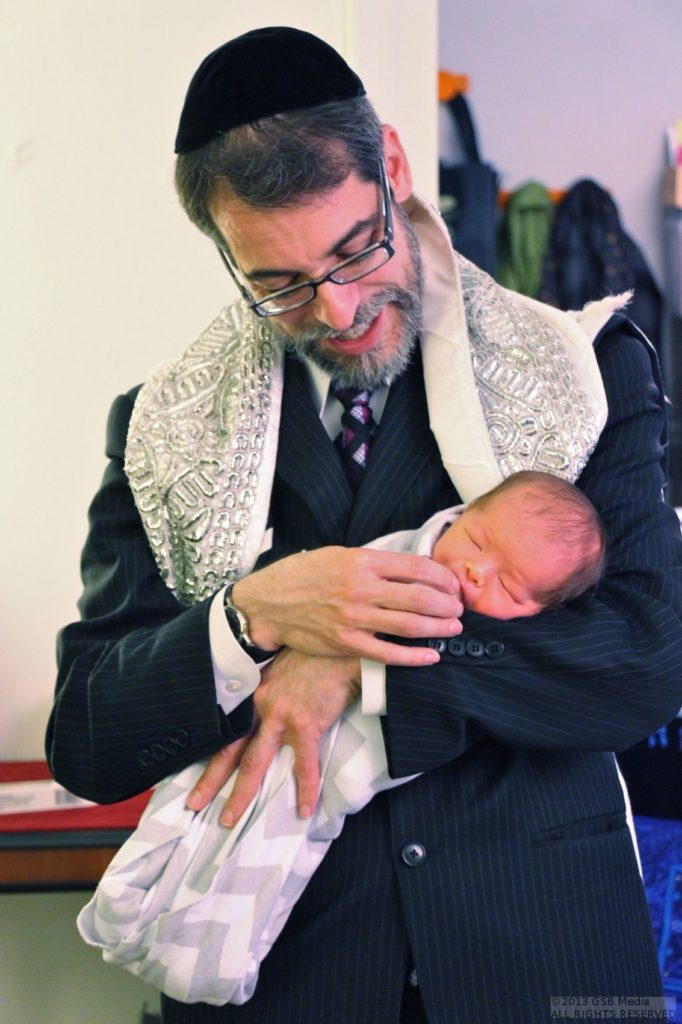America’s Top Mohels
Published April 30, 2014
Who knew? It turns out that mohels not only have one of the most peculiar professions in the Jewish world, but they’re funny, eccentric and self-promotional in odd ways, too.
Circumcision activists pro and con can debate the efficacy of circumcision for everything from health benefits to sexual pleasure to religious mores, but I decided to go a different route with a quest to find America’s Top Mohels.
How did I choose the eight featured here? I did not inspect thousands of instances of their workmanship. I did not rate them according to precision, style or performance. I relied on some tips (!) from insiders, with an eye toward quantity and diversity. The list is not meant as a definitive ranking; these simply are eight top American mohels, presented in random order.
Looking for a mohel in your area? Check out Kveller’s national Mohel Directory.

Michael Rovinsky: “The truth is I hate crying kids and I can’t stand the sight of blood.” (Courtesy Michael Rovinsky)
Michael Rovinsky
Foreskin count: Probably close to 9,000 circumcisions. Nowadays I do more non-Jewish babies than Jews.
Market area: St. Louis and Dallas.
Trademark: License plate reads M-O-H-E-L.
First bris: I remember it like yesterday. It was in yuppie Baltimore, in 1988 or ’89. I had done each part of the bris hundreds of times, it was just putting it all together and doing it alone. I was nervous. It took about a year for this baby to walk after the bris.
Most memorable bris: I was in Dallas in 1992. I set up an adult circumcision program for the Russians. I’m in a doctor’s office, and a 28-year-old Russian immigrant who had been in America for only a week comes in. I scrub him up, give him an injection, put on the shield, ready to go. He says, in broken English, “Me do cut like Abraham.” He reaches for the knife. I say the blessing, he repeats it word for word, and he gives himself a bris. After he was done I did the stitches and went back to my car and cried. What self-sacrifice.
Most at once: I work for 150 doctors and midwives doing non-Jewish babies around the country. Those are easier because they don’t have to be on day eight. I’ll fly to Dallas and do 30 babies.
Unusual location: Once I did it in the back of an 18-wheeler cab at the Flying J truck stop in Illinois. It was for a Jewish family passing through from Iowa. It wasn’t on the eighth day, but it was a kosher bris.
Inspiration: I knew I was going to go into Jewish outreach, but I never wanted to be a pulpit rabbi. A bris is a natural entrée point into people’s lives. Once people get married and have a kid they begin to think about eternity and beyond themselves. I wanted to become a mohel to be a Jewish resource for these families. The truth is I hate crying kids, and I can’t stand the sight of blood.
Time: Less than 15 seconds.
Anesthesia: Generally no. If a family wants it, I do it. An injection hurts more than the bris. For the bris itself, the closest parallel is ripping off a Band-Aid.
Price: I don’t charge; people give an honorarium. It’s suggested. Depending on the city, it runs from $275 to $1,500-$2,000. Where I live in St. Louis it’s around $500.
What you do when you’re not circumcising: I’m always working. Aside from circumcising, I raise about $150,000 a year for the Jewish Student Union, an outreach program for unengaged and under-engaged Jewish high school students.
Website: brismilah.org. My phone number is 1-800-85-MOHEL. Locally, it’s 727-BRIT.
| Prev | Next |
ADVERTISEMENT: Looking for a Jewish camp? Visit OneHappyCamper.org and see if your child qualifies for $1000 of their first summer or introductory rates through BunkConnect, programs of Foundation for Jewish Camp.
![]()















